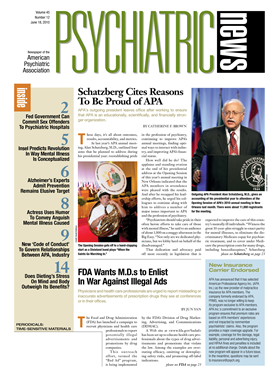Enactment of the sweeping new law that aims to open access to health care for millions of uninsured people may also increase the opportunity for a large expansion in misleading marketing practices by some allied health care workers. That's why physicians' advocates are urging passage of a federal measure to require truth in advertising by professionals who provide health care.
Rep. John Sullivan (R-Okla.) introduced the Healthcare Truth and Transparency Act (HR 5295) on May 13 to require all health care professionals to fully and accurately inform patients of their qualifications and training. The measure would direct the Federal Trade Commission to take action when it finds misrepresentations in advertisements of a health care professional's licensing, education, training, degree, or clinical expertise.
The issue of professional misrepresentation in ads has long concerned physician groups and has taken on a new urgency with the enactment of a national health care law that will dramatically expand health coverage.
“Patients today are confused about the health care system in general, especially when it comes to differentiating among the qualifications of the many types of health care providers, including physicians,” said Sullivan in a written statement. “The need for this problem to be addressed is only growing as the new health care law will add more than 32 million Americans to our health care system.”
The urgent need for clarity in advertising is a point echoed by physicians' advocates, who note that patients place a priority on knowing the qualifications of clinicians prior to treatment. The vast majority of Americans (90 percent) appear to be concerned about the qualifications of the professionals who provide their health care, according to a 2006 nationwide survey by the Coalition for Health Care Accountability, Responsibility, and Transparency (CHART), a physicians' advocacy group that includes APA.
The CHART survey also found that 86 percent of Americans support federal legislation to make it easier for them to understand the qualifications of the health care professionals who treat them and their families.
Accurate disclosure of professional qualifications is especially critical for patients with psychiatric illness.
“Patients living with mental illness can easily be confused about the level of qualifications of health professionals and are especially vulnerable to fraudulent advertising,” said then APA President Alan Schatzberg, M.D., in a written statement. “This bill will help Americans better understand the types of care that are provided by different professionals and allows them to have more manageable expectations in terms of the care they are going to receive.”
The legislation is backed by a coalition of physician groups, including APA and the AMA. In a May 11 letter to the bill's sponsors, APA and 11 other medical organizations cited increasing patient confusion regarding the qualifications of the many types of health care providers—including physicians, technicians, nurses, physician assistants, and other allied health professionals.
“All of these providers play an important and distinct role in the health care delivery system,” the medical groups said. “However, ambiguous provider nomenclature and related advertisements and marketing are exacerbating patient uncertainty.”
The legislation faces opposition from nurse advocates, including the American Nurses Association (ANA), which views it as part of a continuing effort to limit the scope of practice of nonphysician health care workers. A statement by the ANA says that advanced-practice registered nurses “are prepared through advanced education and clinical training to provide a wide range of health care services to individuals of all ages.”
Supporters of the bill counter that it would hold physicians and allied health workers to the same truth-in-advertising standards so patients can be better informed about who is treating them.
The legislation mirrors similar bills that were introduced but did not advance in previous years. However, its supporters hope to leverage the needs of the coming wave of newly insured patients seeking clinical care to drive it forward.
The Healthcare Truth and Transparency Act can be accessed at <http://thomas.loc.gov> by searching on the bill number, HR 5295. 
